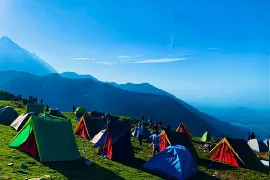10 Years Experience
Specialized in Trekking Camping

Yuksom Bazar Main Road
Near Hotel Yangri Gang,
West Sikkim, Pin No - 737113
SIKKIM
The Snow Leopard Trek is a thrilling adventure that takes trekkers into the remote and rugged landscapes of the Himalayas in search of the elusive snow leopard. Here are some key highlights of the Snow Leopard Trek:
The Snow Leopard Trek offers an unparalleled opportunity to experience the beauty and biodiversity of the Himalayas while embarking on an unforgettable wildlife adventure.
The Snow Leopard Trek takes place in the remote and rugged regions of the Himalayas, primarily in the northern Indian states of Ladakh and Himachal Pradesh. Trekkers often venture into high-altitude areas and remote valleys where snow leopards are known to inhabit.
Key locations along the Snow Leopard Trek route include:
The exact locations visited during the Snow Leopard Trek may vary depending on the specific itinerary and trekking route chosen by tour operators.
Reaching the starting point of the Snow Leopard Trek typically involves several steps, considering the remote and high-altitude nature of the trekking routes. Here are some common ways to reach the starting point:
It's essential to plan transportation arrangements in advance and consider factors such as altitude acclimatization and local weather conditions when preparing for the journey.
The distance covered during the Snow Leopard Trek varies depending on the specific route chosen and the duration of the trek. As the trek routes often traverse remote and rugged terrain, distances can range from tens to hundreds of kilometers.
It's common for Snow Leopard Treks to span several days, covering significant distances as participants explore the diverse landscapes and ecosystems of the region. Trekkers should be prepared for long days of walking and camping in the wilderness.
Exact distances for specific Snow Leopard Trek routes can be obtained from trek organizers or detailed trekking itineraries provided by tour operators.
The Snow Leopard Trek takes participants through various altitudes, traversing high mountain passes, valleys, and rugged terrain. The height or elevation reached during the trek can vary significantly based on the specific route chosen and the highest points along the journey.
Participants may ascend to altitudes ranging from approximately 3,000 meters (9,800 feet) to well over 5,000 meters (16,400 feet) above sea level during different sections of the trek.
It's essential for trekkers to acclimatize properly to the high altitude and be prepared for changes in weather and terrain as they navigate through the Snow Leopard habitat.
The best time to embark on the Snow Leopard Trek largely depends on weather conditions, wildlife movements, and accessibility to the region. In general, the optimal time for the Snow Leopard Trek is during the winter months, typically from December to March.
During these months, the snow cover in the region is at its peak, making it easier to spot snow leopards against the white backdrop. The colder temperatures also drive the elusive cats to lower altitudes in search of prey, increasing the chances of sightings.
It's important to note that trekking during the winter months requires thorough preparation for harsh weather conditions, including sub-zero temperatures and snowfall. Trekkers should be equipped with appropriate gear and clothing to withstand the cold.
Additionally, guided tours and expert trackers are often available during the winter season, enhancing the overall experience and increasing the likelihood of encountering snow leopards in their natural habitat.
Embarking on the Snow Leopard Trek from Delhi involves several steps and logistics due to the remote location of the trekking area. Here is a general outline of how to reach the Snow Leopard Trek from Delhi:
It's essential to plan the journey well in advance, considering factors such as acclimatization to high altitudes, weather conditions, and permits required for trekking in the region. Additionally, trekkers should be prepared for challenging terrain and rugged landscapes along the Snow Leopard Trek route.
When embarking on the Snow Leopard Trek, it's crucial to pack appropriately to ensure a safe and comfortable journey through the rugged terrain and harsh weather conditions. Here is a list of essential items to carry:
It's essential to pack light while ensuring that you have all the necessary items to stay safe and comfortable during the Snow Leopard Trek. Be mindful of weight restrictions and space limitations in your backpack.